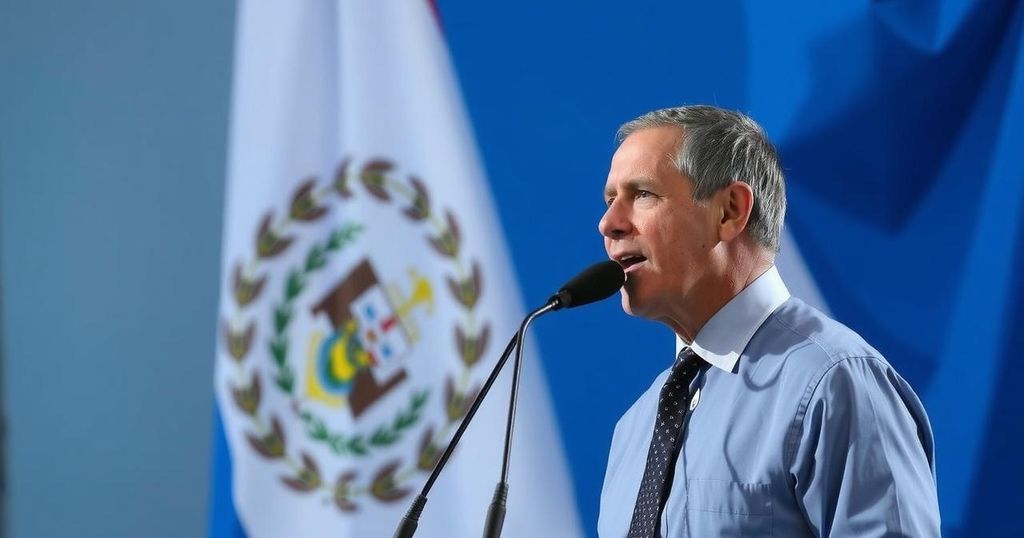Uruguay Prepares for Presidential Run-Off Election Amidst Regional Political Trends
The presidential elections in Uruguay have resulted in a likely run-off vote between Yamandu Orsi of the centre-left Frente Amplio party and Alvaro Delgado of the centre-right Partido Nacional, scheduled for November 24. The elections also involved referendums on retirement age and police powers, which early exit polls suggest were rejected. This electoral phase marks a break from the extreme political divisions seen in neighboring countries, reflecting a more centrist approach among candidates and a generally satisfied electorate regarding economic conditions but concerned about crime.
Uruguay’s recent presidential election has yielded results indicating a likely run-off vote between two prominent figures: Yamandu Orsi, a leftist history teacher and representative of the centre-left Frente Amplio party, and Alvaro Delgado of the centre-right Partido Nacional. According to estimates by Equipos Consultores, Orsi garnered approximately 43.2 percent of the votes cast, while Delgado followed with 28 percent. The third candidate, Andres Ojeda, a lawyer modeled after Argentina’s Javier Milei, received between 15.5 to 16 percent of the total votes. As a result, the upcoming presidential run-off is set for November 24. In addition to the presidential elections, voters in Uruguay also participated in referendums aimed at reducing the retirement age to 60 and easing restrictions on police powers during nighttime operations. Despite initial responses to these measures, early exit polls indicated a potential rejection of both propositions. This election cycle marks a deviation from the polarized political landscape commonly seen across Latin America, characterized by stark ideological divides in nations such as Argentina, Brazil, and Mexico. In contrast, candidates in Uruguay noticeably align on a variety of policies, reflecting a generally satisfied public sentiment towards government performance, evidenced by President Luis Lacalle Pou’s favorable approval rating of 50 percent. Though the ruling conservative coalition has faced challenges regarding crime management, particularly concerning drug-related violence, the electorate remains primarily focused on economic issues, including employment and wages. President Lacalle Pou, owing to constitutional restrictions, cannot pursue a second consecutive term, prompting a shift in the political dynamic should Orsi emerge victorious. Orsi is perceived as a continuation of the leftist policies introduced by former President Jose Mujica, suggesting a potential return to more progressive governance after five years of conservative administration. Mujica himself, despite health challenges, actively participated in the campaign, highlighting his enduring influence in Uruguayan politics.
The current political climate in Uruguay stands in stark contrast to various other Latin American countries, which have recently witnessed considerable political shifts to the right and left. The presidential election primarily involved discussions surrounding economic stability, governance effectiveness, and crime, particularly drug-related issues. Pollsters had long anticipated a run-off scenario due to the fragmented nature of the electorate, reflecting competing policy perspectives among candidates. Understanding the candidates’ political backgrounds is crucial, as Yamandu Orsi draws influence from historical leftist roots, particularly from former Cuban intelligence officer and ex-revolutionary leader Jose Mujica, while Alvaro Delgado represents the conservative viewpoint in response to the contemporary socio-economic challenges facing the nation.
In conclusion, Uruguay’s presidential elections, set against a backdrop of regional political volatility, show a clear indication of a contested run-off vote. With candidates Orsi and Delgado embodying significantly varying political ideologies and approaches, the forthcoming election is poised to carry substantial implications for Uruguay’s political trajectory. As the electorate prioritizes economic and safety issues, the outcome of this electoral process will undoubtedly influence the nation’s governance and policy direction in the years to come.
Original Source: www.aljazeera.com




Post Comment